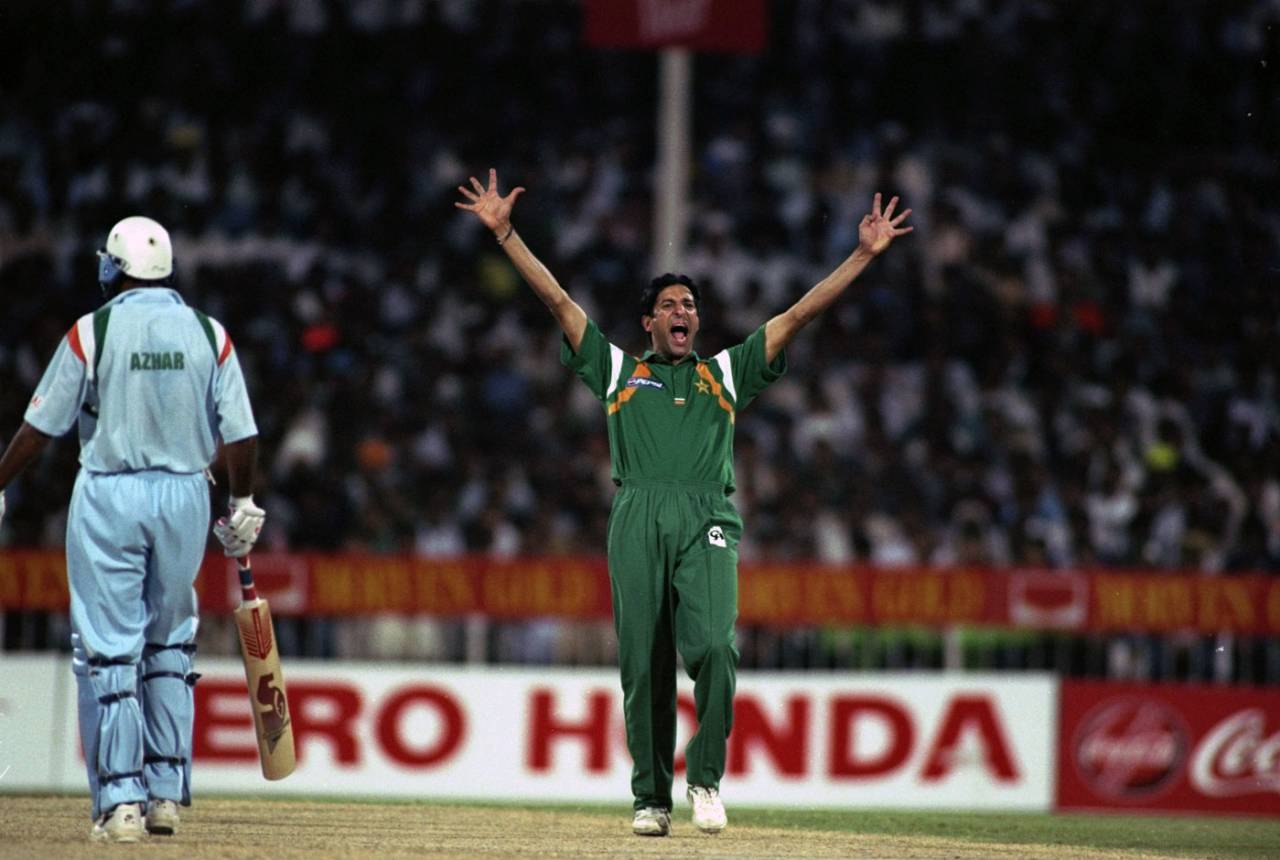The home invasion
The Emirates have been a home away from home for Pakistan for three decades now. To see the IPL, which excludes Pakistan, being played there must feel like betrayal
Hassan Cheema
19-Apr-2014

Wasim Akram got a fair chunk of his 502 ODI wickets in Sharjah • Getty Images
A man dressed in Arab garb is sitting alone. Within seconds he's surrounded by Pakistanis of various professions, each begging him for a ticket to paradise, the visa for Dubai. It's a sketch from Fifty Fifty, probably the most influential Pakistani TV show ever. Like so much else in the show, that 100-second skit hits the nail on the head, encapsulating the viewpoint that everyone in the country had towards the Gulf in general, and Dubai in particular. The sketch is from the early '80s but it could have been shot at any time in the last quarter of the 20th century and it would have been part of the zeitgeist.
The Emirates, in the eyes of the Pakistani lower and middle classes, was the land of opportunity, the gateway to a better life - the Pakistani dream was to not be in Pakistan. But by the end of the century, Pakistanis were fond of the Emirates for a whole other reason. It had become the home of Pakistani cricket.
Now that may seem a bit strong to the defenders of the Gaddafi or NSK, but here are the facts: from playing their first ODI in Sharjah in April 1984, till April 2003 (when the ground went off the international circuit), the Pakistan national team played more at that small stadium in the desert (108 ODIs) than they did in Pakistan (92 ODIs). They even had a better win-loss ratio in Sharjah (2.24) than they did in Pakistan (1.69). Pakistan won 74 off their 108 matches in Sharjah, yet even the lone tie there is remembered fondly by a generation that would never see Abdul Razzaq the same way again.
Sharjah became the place where Pakistan called out other teams. It became the place where new heroes were born and legends shone. Almost a quarter of Wasim Akram's ODI wickets were taken in Sharjah, and seven of Saeed Anwar's 20 hundreds were scored there. The two greatest Pakistani teams are defined more by what they did in the Emirates than what they did at home. It was not coincidence that when Osman Samiuddin wrote of the haal of Pakistan, the match that became his inspiration was a Pakistani comeback in Sharjah. In that article Younis Khan describes the haal as a "tradition of Sharjah". Sharjah really did see the best of Pakistan.
When the stadiums in Dubai and Abu Dhabi were inaugurated in the mid-noughties it seemed like a poor attempt to try and recreate lightning in a bottle - there was too much that Pakistan did with Sharjah; no ground was going to truly replicate that or replace it. But as the Emirates had seen the best, they were to drag Pakistan out of the worst too. Pakistan returned to the UAE immediately after the fateful tour of England in 2010, and four years later they are still unbeaten there. It has been the backdrop to Pakistan's resurgence, and stagnation, and after a record of eight wins, three draws and eight losses in the 19 home series before the move to the UAE, Pakistan have now gone five series without losing.
The Emirates have essentially become Pakistan's home away from home. One could go as far as to say that Pakistan enjoy themselves more there than they would at home.
And now the IPL is being played there.
The IPL is, in some ways, the living embodiment of Pakistan's place in international cricket. It represents the monopolisation of the game by India, an idea that is not particularly well appreciated across the Radcliffe Line. It is also - in the absence of Pakistani players in the league - a sign of the pariah nature that Pakistan has in international cricket now. As players from across the world get together to improve their short-form games and interact with the best in the world, Pakistani players look on from the outside, envious, if not of the experiences then certainly of the money involved. And of course, it allows Pakistani uncles to air their victim complexes - to rant about how the whole world is crooked yet it's only our lot that is punished for it; it's us against the world, as shown so clearly by this domestic T20 league.
The IPL in the UAE, the IPL in Sharjah - it's just not supposed to be, the Pakistani fan wonders. It's like wooing and then loving someone for two decades and then finding out that the beloved has given herself over to a sugar daddy who'll use her for three weeks and throw her away. But at the end of those three weeks, Pakistan will be there, forever willing to love some more. Or that's what we'd like to tell ourselves.
Stadiums are just structures, arenas to hold mindless children's games in. And yet they develop souls; we give them characteristics, attach memories to them, make them our own. Saeed Anwar caressing a ball through the off side towards those canopied stands, as Henry Blofeld pontificated over nothing.
Sharjah, to the Pakistani mind, is an amalgam of memories that have no link except their common backdrop. And an international event that specifically bars Pakistanis from it being played in the land that Pakistanis consider their own, it just feels wrong. Nostalgia isn't supposed to be made of this.
Hassan Cheema is a sports journalist, writer and commentator, and co-hosts the online cricket show Pace is Pace Yaar. He tweets here